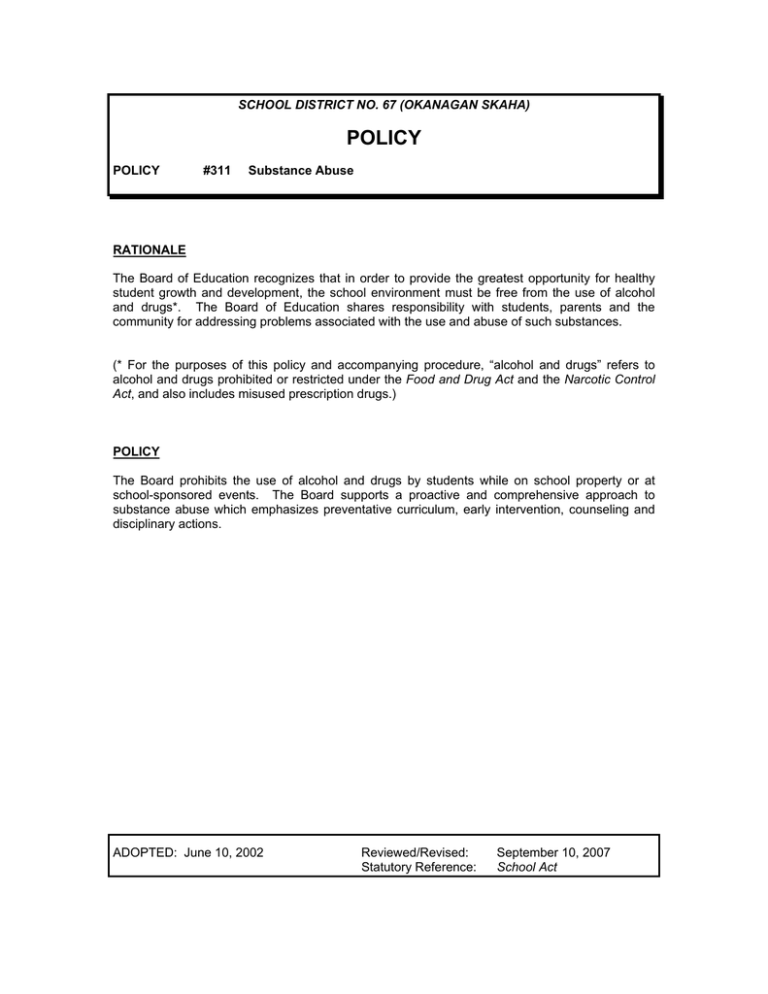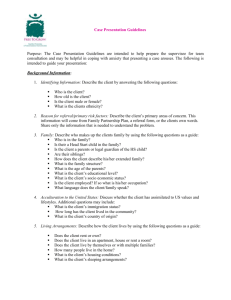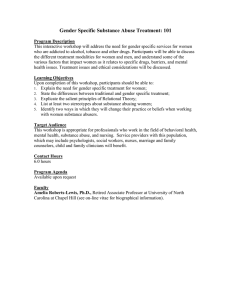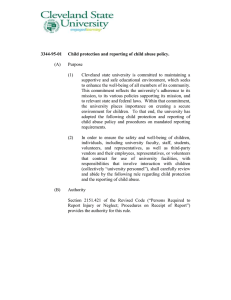POLICY
advertisement

SCHOOL DISTRICT NO. 67 (OKANAGAN SKAHA) POLICY POLICY #311 Substance Abuse RATIONALE The Board of Education recognizes that in order to provide the greatest opportunity for healthy student growth and development, the school environment must be free from the use of alcohol and drugs*. The Board of Education shares responsibility with students, parents and the community for addressing problems associated with the use and abuse of such substances. (* For the purposes of this policy and accompanying procedure, “alcohol and drugs” refers to alcohol and drugs prohibited or restricted under the Food and Drug Act and the Narcotic Control Act, and also includes misused prescription drugs.) POLICY The Board prohibits the use of alcohol and drugs by students while on school property or at school-sponsored events. The Board supports a proactive and comprehensive approach to substance abuse which emphasizes preventative curriculum, early intervention, counseling and disciplinary actions. ADOPTED: June 10, 2002 Reviewed/Revised: Statutory Reference: September 10, 2007 School Act SCHOOL DISTRICT NO. 67 (OKANAGAN SKAHA) REGULATIONS AND PROCEDURES POLICY 1. b) c) d) e) The District's Substance Abuse Policy and Procedures; The incidence and identification of substance abuse; and Their duty to report all cases of substance abuse to the school principal or designate. Schools will encourage, model and teach students to develop attitudes and effective life skills that promote healthy decisions. The curricula for teaching substance abuse prevention are prescribed in "Personal Planning" K to 7 and "Career and Personal Planning" 8 to 12. In addition, the Board supports other school and community initiatives such as the DARE (Drug Awareness Resistance Education) Program and the Assets for Youth initiative which may be available. The objectives of preventive curricula are: a) b) c) d) 4. Provide students with age appropriate instruction on the prevention of substance abuse; Encourage and support the identification of and early intervention into problems of substance abuse by students through utilization of school as well as community resources; Provide fair and equitable response procedures and consequences regarding substance related infractions; Provide continued support for the services provided by school-based student services personnel; Provide in-service for administrators, counselors and teachers regarding implementation of the Substance Abuse Policy and Procedures. All employees of the Board share responsibility for increasing their awareness and knowledge of: a) b) c) 3. Substance Abuse The Board will: a) 2. #311 To promote positive self-worth and personal confidence in students; To help students differentiate between the medicinal and harmful use of drugs; To help students develop effective decision-making, communication and refusal skills; and To promote healthy alternatives to mood altering substances. The District will provide appropriate support and intervention within its resources to students who possess/use and/or abuse drugs and alcohol. The focus will be the early identification of at-risk students who display irregular behaviour, inappropriate decisionmaking and declining personal performance. Intervention will be made available to atrisk students and/or first-time offenders by counselors or community agencies, as appropriate. Positive and confidential help will be given to students who voluntarily seek assistance in overcoming substance abuse and problems. Policy #311 Regulations and Procedures – Page 2 5. When, in the course of his/her duties, any school district staff member has reason to believe that any student is in direct or indirect possession of any substance as defined above, it is the duty of that staff member to refer the matter to the appropriate school administrator and/or teacher in charge. Note: Indirect possession would include having another person store or possess the substance. 6. When a school administrator has reason to believe that a student, while attending school or involved in an official school function, is in possession or is under the influence of a substance as defined above, it is the duty of the administrator to: a) b) Ensure the personal safety of the student and others; Determine an appropriate course of action. This may include disciplinary processes and/or the development of an intervention and support plan as appropriate. Dependent on the individual circumstances and the age and grade of the student, the administrator will consider the following in the development of an appropriate plan of action in consultation with counselor(s) and parents (guardian): a) b) c) d) e) Referral to the School Based Prevention Worker (where available); Referral to community agencies; Provision of peer counseling; Suspension of five days or less, or suspension and referral to the District Discipline Committee; and Notification of police. 7. When any staff member feels a student's substance use or other risk factors may put the student at extreme risk of harm, it is his/her duty to report the concern to the Ministry for Children and Family Development – Children Protection Branch. 8. Consequences The possession, consumption/use, sale or distribution of alcohol or drugs at school functions or while under the jurisdiction of the school will result in appropriate consequences pursuant to Policy 310 (Code of Conduct) and/or Policy 312 (District Discipline Committee). These may include suspension or expulsion, referral to community agencies, and notification to the RCMP. 9. Drug Trafficking Where there are reasonable grounds to conclude that a student is in possession of a substance for the purposes of selling, supplying or making available at school functions or while under the jurisdiction of the school, the principal should normally suspend the student immediately, inform the parents, refer the student to the District Discipline Committee, and report the incident to the police. ADOPTED: June 10, 2002 Reviewed/Revised: Statutory Reference: September 10, 2007 School Act




